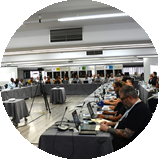|
|
|
| |

|
|
ICCAT Newsletter
September 2024
|
|
|
|
|
|
| |
|
Dear Readers and Tuna World Friends:
We are once again at an important time (one of the significant events marked by the calendar) in the ICCAT annual calendar, the intersessional work of which has been more intense than usual. With your continued support, the usual progress is being consolidated, and I would like to thank you very much for that!
The Commission's various bodies have continued their work, which has covered all of ICCAT's objectives, with increasing emphasis on issues relating to the impact of climate change on its fisheries, alongside those relating to the continuation of MSEs, stock assessments, improving its functioning and strengthening its cooperation with its partners, for example.
As in recent years, the Species Group meeting (16 to 21 September) and the SCRS Plenary Session (23 to 27 September) were held in hybrid format in Madrid (Spain). In order to respond to the Commission's requests and issues, the Plenary considered among other major subjects, the stock assessments of blue marlin, yellowfin tuna and Mediterranean albacore, the revised ICCAT Action Plan on Climate Change, the progress on the MSEs processes, with particular emphasis on western skipjack and North Atlantic swordfish and continued to review its various research programmes.
The Commission, for its part, will hold its 24th Special Meeting in hybrid format at the Parklane Hotel, Limassol (Cyprus), at the kind invitation of the European Union and Cyprus, from 11 to 18 November 2024. This session will be preceded by the Third Intersessional Meeting of Panel 1 (9-10 November 2024), also in hybrid format.
Let's keep moving forward together!
See you soon in Limassol (Cyprus) !
Happy reading
|

Executive Secretary
|
 |
|
|
|
|
| |
|
|
|
|
ICCAT Participation and/or organization to Workshops, Seminars and Courses
|
|
 |
|
The ICCAT Secretariat has organized and participated in the following:
| |
ICCAT workshop in the Caribbean (West Atlantic) region for the improvement of statistical data collection and reporting on small scale (artisanal) fisheries (Panama City (Panama), 19-23 February 2024) |
|
| |
Workshop of the SWOYP (Hybrid, Madrid (Spain), 27-29 February 2024) |
|
| |
SCRS Workshop (Hybrid, Madrid (Spain), 18-20 March 2024) |
|
| |
Online training Workshop session on using ICCAT's Integrated Online Management System (IOMS) (30 April, 24 June and 7 October 2024) |
|
| |
CITES Workshop on CITES Listing Criteria (Geneva, Switzerland, 22-23 April 2024) |
|
| |
CITES Workshop on CITES Non-Detriment Findings (Geneva, Switzerland, 24-25 April 2024) |
|
| |
Workshop on ECOREGIONS (Online, 24-26 April 2024) |
|
| |
ICCAT Workshop on the use of the Bycatch Estimation Tool (hybrid/Madrid (Spain), 15-17 July 2024) |
|
| |
Workshop on Data Limited assessment Methods for Small tunas (Madrid, Spain, 10-13 Sept 2024) |
|
|
Recent Meetings that have taken Place
| |
2024 Commission meetings
February
|
| |
March
|
| |
May
|
| |
June
|
| |
July
|
| |
2024 SCRS meetings
March
|
| |
April
|
| |
May
|
| |
June
|
| |
July
|
| |
September
|
2024 Calendar for remaining events
|
Additional information on these meetings is available on the ICCAT website.
|
|
|
|
| |
| |
| |
| |
ICCAT Data Collection and Research programmes
The last activities planned for the Phase 13 of the Atlantic-wide Research Programme on Bluefin Tuna (GBYP), including some high priority tagging campaigns and further developments of CKMR related models, necessary to complete the BFT Eastern stock CKMR feasibility study, have been successfully finished on 31 July 2023. The new GBYP Phase 14 started on 1 February 2024 including activities to: further support the development of the new ICCAT DBs on electronic tags and biological data; aerial surveys in Central and Western Mediterranean Sea; electronic tagging; and biological sampling and analyses to update and improve the parameters used for stock assessment. The 2024 aerial survey has been carried out successfully, and ten Memorandum of Understanding have been signed to carry out electronic tagging campaigns between September 2024 and the first months of 2025. In addition, new genetic studies designed to better inform the BFT Eastern Stock CKMR feasibility study and support its possible implementation are ongoing. Additional information can be found here.
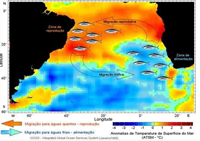
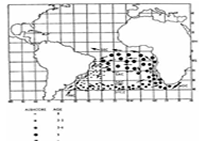
|
|
The ALBYP has prioritized research on the reproductive biology, to improve knowledge on maturity and fecundity for both North and South Atlantic stocks. Preliminary results have been presented to the northern stock, while for the South Atlantic a significant number of new samples has been collected. Preliminary results suggest different maturity schedules for both stocks. For this reason, it is intended to continue these studies in order to verify, or reject, whether these important biological parameters vary between the two Atlantic stocks. Several electronic tagging surveys targeting large individuals have been conducted off the Canary Islands, where 33 MiniPATs have been implanted. In addition, in the Bay of Biscay tagging has targeted small and medium size albacore, with 2 miniPATs and 155 internal archival tags having already been deployed. To date, data from 47 tracks have been gathered (corresponding to more than 5,000 tracking days), including for the first time more than 1-year tracks for nine specimens. The second round of the northern Atlantic Albacore MSE framework, that is expected to be delivered in 2026 has started. The contractors started the elaboration of a grid of reference OMs, and tested the currently adopted MP on this new reference grid. The New Observation Error Model has been developed and plots were produced aiming to discuss the detection of exceptional circumstances, as requested in Rec. 21-04. |
|
The SMTYP continued collecting biological samples aimed at growth, maturity and stock structure studies on small tunas species. These involve a consortium of 13 institutions (10 CPCs), that continued to: i) fill specific size gaps for estimating the growth and maturity parameters for Little tunny (LTA), Atlantic bonito (BON) and Wahoo (WAH); ii) collection of samples to expand stock structure studies for frigate tuna (FRI) and bullet tuna (BLT) in the Atlantic Ocean and the Mediterranean Sea; iii) advance on the estimation of the growth and reproduction parameters for BON, LTA, and WAH; iv) refine the stock structure analysis for WAH, BON, and LTA and determinate the stock structure analysis for FRI and BLT; and, v) investigate genetic species differentiation between FRI and BLT. Samples were obtained from a broad temporal and spatial range, however, some improvements are still required for specific size ranges to allow the conclusion of the ageing and reproduction studies. ICCAT CPC engagement in sampling and analysis for this program is urgently needed. The ICCAT course on the use of data limited methods for the provision of management advice for these tunas stocks was successfully completed by four scientists, which will enhance the capacity of the SCRS to provide management advice for small tuna that play an important role on small-scale artisanal fisheries for many ICCAT costal Contracting Parties. Other research activities conducted throughout 2024 include: updating the biological meta-database, estimation of length-weight relationships representative at the stocks/regional level, calibration and adopting internationally agreed maturity scales and, further develop capacity building on the use of data limited methods for the provision of management advice for these stocks.
|
|
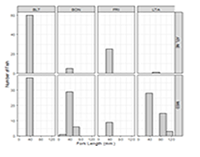
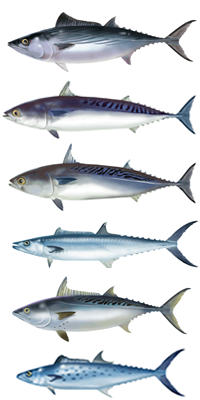
|
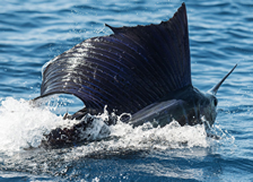
|
|
The (EPBR) evaluates adult habitat use and migration in the Eastern Atlantic through e-tagging and studying growth in the North-eastern Atlantic of blue marlin, white marlin and sailfish. In June 2024 a new contract was awarded to the Institut sénégalais de recherches agricoles (ISRA), Centre de Recherches Océanographiques de Dakar/Thiaroye (CRODT, Senegal) to continue the growth studies. Since the last Newsletter 38 additional samples were collected for the three billfish species, however several gaps have been identified in sampling for several size ranges and, therefore, ICCAT CPC engagement in sampling for this program is urgently needed. A contract shall soon be signed with the Instituto Mexicano de Investigación, Centros Regionales de Investigación Acuícola y Pesquera de Veracruz (Mexico), aiming to study blue marlin reproduction in the Gulf of Mexico. A total of two white marlins were tagged with satellite tags, and 29 additional specimens were tagged with conventional tags. There are plans to carry out several additional trips in September and October 2024 devoted to satellite tagging.
|
|
Within the SRDCP age readings of new vertebrae samples of southern Atlantic shortfin mako have been taking place, and preliminary growth curves have been presented aiming for the upcoming stock assessment in 2025. Genetic analysis of porbeagle based on mitogenomic analysis continued with the analysis of new samples from the southwestern Atlantic. Results showed that the Northern and Southern Hemisphere porbeagles are two distinct sibling species. While distribution range of the Southern Hemisphere porbeagle is fairly extense throughout the South Atlantic, the Indian, and the South Pacific Oceans, that of the North Atlantic porbeagle is limited to the North Atlantic Ocean. A successfully electronic tagging campaign was carried out along the equatorial Atlantic area. A total of 16 specimens were tagged, including eight silky sharks, three bigeye threshers, two smooth hammerheads and one oceanic whitetip, and one specimen from the secondary shark species, namely one blue shark. Additional e-tagging has been conducted in the northern Atlantic, that allowed tagging five silky sharks, two blue sharks, one smooth hammerhead and one porbeagle, while conventional tagging of blue shark is being opportunistically conducted mostly in the North-eastern Atlantic. The reproductive biology of the North Atlantic shortfin mako continued based in the quantification of reproductive hormones concentrations, with preliminary results suggesting muscle tissue can be used to assess the species reproductive characteristics and critical information regarding important reproductive habitats for the North Atlantic shortfin mako. |
|
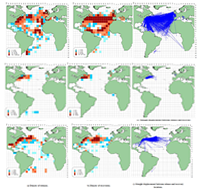
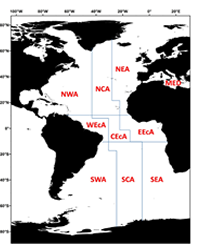
|
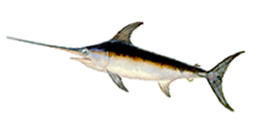
|
|
Within SWOYP sampling continued for swordfish, from a broad temporal and spatial range in the North and South Atlantic and Mediterranean. Fish were sampled for size, sex, and maturity. Sample processing has continued, particularly for genetic studies aiming determination of stock boundaries, and through bomb radiocarbon dating to advance the age and growth study. Several gaps have been identified in sampling and the next steps require examining sampling representativeness relative to spatial and temporal patterns in recent catch data, but ICCAT CPC engagement in sampling and analysis for this program is urgently needed.
Two very successful electronic tagging campaigns took place in the North-western Atlantic (off Canada) and in the North-eastern Atlantic, with a total of 10 swordfish specimens tagged in each area.
|
In 2024, the TTRaD has prioritised MSE developments, sample collection for age and growth, and the continuation of funds for tag recovery and maintenance of AOTTP databases. MSE developments have been provided throughout the year at the yellowfin tuna data preparatory and stock assessment meetings and intersessional MSE subgroup meetings. For the western skipjack MSE, updates include development of Candidate Management Procedures (CMPs), incorporation of abundance indices and robustness tests to account for the effects of Climate Change. For the multi-stock MSE, technical work has been undertaken to explore uncertainties, develop conditioned operating models and observation error models, incorporation of Climate Change impacts, and multi-species management procedures (harvest control rule development). To aid in building understanding of the developed MSEs, a workshop is also planned for October 2024 with a focus on building understanding of tropical tuna-specific MSEs. For the age and growth work, relatively limited samples have been collected to date due to closure of fishing in important areas, though further sampling is ongoing with sample collection from the Gulf of Guinea, Central and South Atlantic.
|
|
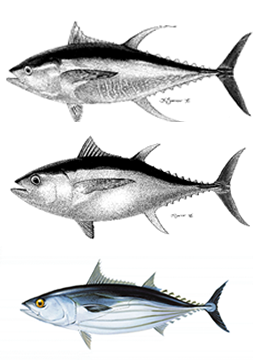
|
|
|
|
| |
|
| |
Voluntary contributions

The new ICCAT/Japan Capacity-building Assistance Project (JCAP-3), which corresponds to the third Phase of a further 5-year Project that will end on 30 November 2029, has been announced. Funding for year-1 is available for the total amount of €98,859, and interested CPCs have been invited to apply for possible funding for activities to be developed between December 2024 and 30 November 2025, within the following work packages:
- Organization of workshops and learning materials for full implementation of conservation and management measures and data improvement;
- Scientific capacity building through Masters degrees and/or long-term training in research laboratories;
- Enhanced use of data for effective management and improved stock assessment;
- Activities to reinforce data collection and monitoring of tuna fisheries to prepare for and adapt to new CDS;
- Trials of efficient and accurate monitoring of bluefin tuna farms using AI.
Since the last newsletter the ICCAT Secretariat has received the following voluntary contributions:
The United States will provide ICCAT with $350,000 to support ICCAT’s activities in fiscal year 2025, of which
- $150,000 to be allocated to the US Data Fund;
- $200,000 for the US Capacity Building Fund;
- In addition, the US provided financial support for the attendance of several participants on the ICCAT Workshop on use of the Bycatch Estimation Tool (15-17 July, Madrid, Spain).
The ICCAT Secretariat signed three new grant agreements with the European Union:
- Contribution to the organization of the ICCAT Annual Meeting (November 2024, Cyprus) - the total amount is €1,000,000, of which the European Union is financing 80% (€800,000);
- Strengthening the scientific basis for decision-making in the International Convention for the Conservation of Atlantic Tunas (ICCAT) - the total amount is €1,000,000.00, of which the European Union is financing 80% (€800,000);
- GBYP, Phase 14 - the total amount is €1,700,000, of which the European Union is financing 47% (€800,000);
In addition, the following grant agreements with the European Union have been closed since the last Newsletter:
- ICCAT – Capacity building - the total amount is €375,000, of which the European Union financed 80% (€300,000);
- Vessel Manager Module of the IOMS - the total amount is €125,022.36, of which the European Union financed 80% (€100,000);
- GBYP, Phase 13 - the total amount is €1,250,000.75, of which the European Union financed 80% (€900,000).
|
|
|
|
|
| |
|
| |
Other News
|
|
 |
|
24th Special Meeting of the Commission
The International Commission for the Conservation of Atlantic Tunas (ICCAT) will meet in Limassol (Cyprus) at the 24th Special Meeting of the Commission to take important decisions on the conservation and management of ICCAT fisheries.
|
|
|
|
Publications
Volumes 1 to 4 of the Report for the biennial period 2022-23, Part II (2023), corresponding to the 2023 Annual Reports have been published. Please access the report here.
To date first eight issues of Volume 81 of the ICCAT Collective Volume of Scientific Papers, include 84 scientific papers and reports presented to the SCRS during 2024, have been published here. |
|
|

|
|
|
|
|
| |
Staff
|
|

|
|
Mr. Carlos Mayor
became the Statistics Department Head and Data Programmer further to the retirement of Mr. Carlos Palma. |
|
|
|

|
|
Mr. Aitor Elorriaga
joined as Software Developer (IOMS) in March 2024. |
|
|
|
Mr. Fabio Fiorellato
joined as Biostatistician in March 2024. |
|
|

|
|
|
Mr. Álvaro Fúster
joined as IT Specialist Technician in May 2024. |
|
|

|
|
|
|
|
The ICCAT Secretariat would like to wish all these new members a warm welcome and great success in their new careers as staff member of ICCAT. |
|
|
| |
| |
| |
|
|
|
 |
© 2024. ICCAT Newsletter. |
|
| |
| |
|
|
|









